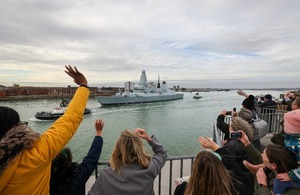Defence Secretary sends Royal Navy destroyer east of Suez to safeguard security in the Gulf
HMS Diamond has set sail to bolster UK naval forces across the Middle East.

HMS Diamond departed Portsmouth earlier this month ahead of its deployment
HMS Diamond is en route to join Operation Kipion, the UK’s maritime presence in the Gulf and the Indian Ocean, the Defence Secretary has announced.
As a powerful demonstration of the UK’s commitment to regional security, the Type 45 Destroyer will bolster the UK’s naval presence in the Gulf and work to deter escalations from malign and hostile actors who seek to disrupt maritime security.
The Type 45 destroyer will conduct operations to ensure freedom of navigation in the region, reassure merchant vessels and ensure the safe flow of trade. She will join HMS Lancaster, which deployed to the region last year, as well as three mine hunters and a Royal Fleet Auxiliary (RFA) support ship.
Defence Secretary Grant Shapps said:
Recent events have proven how critical the Middle East remains to global security and stability.
From joint efforts to deter escalation, following the onset of the renewed conflict in Israel and Gaza, to now the unlawful and brazen seizure of MV Galaxy Leader by the Houthis in the Red Sea – it is critical that the UK bolsters our presence in the region, to keep Britain and our interests safe from a more volatile and contested world.
Today’s deployment will strengthen the Royal Navy’s patrols, help to keep critical trade routes open and prove that our commitment to regional security not only endures but enhances.
Her deployment follows increasing concerns over maritime security at narrow sea trade routes worldwide, known as chokepoints. The ship is part of the UK’s commitment to supporting security in the region and the global maritime commons.
Operation Kipion is the UK’s long-standing maritime presence in the Gulf and the Indian Ocean. In addition to HMS Lancaster, a squadron of three mine hunting vessels (HMS Bangor, HMS Chiddingfold, and HMS Middleton) and a Royal Fleet Auxiliary support ship (RFA Cardigan Bay) are also deployed as part of the operation, helping to keep the vital trade routes of the Middle East open for business.
Royal Navy vessels have been permanently deployed to the region since 1980 and have fallen under Operation Kipion since 2011. Under the command of the UK Maritime Component Command (UKMCC) in Bahrain, they work with allies and partners across the region, including under the Combined Maritime Forces partnership.
HMS Diamond is deploying with a Wildcat helicopter onboard, a highly capable aircraft which has been central to HMS Lancaster’s activities since its deployment in 2022, including when it seized substantial quantities of illegal drugs and intercepted weapons being smuggled in international waters.
The additional deployment of HMS Diamond, one of the Royal Navy’s most advanced vessels, will significantly bolster international efforts to protect maritime security in the region.
The waters of the Gulf are vital routes for merchant shipping, including for tankers carrying much of the UK’s supply of liquefied natural gas. Around 50 large merchant ships each day pass through the Bab-el-Mandeb, connecting the Red Sea to the Gulf of Aden, while around 115 major merchant ships pass through the Strait of Hormuz.